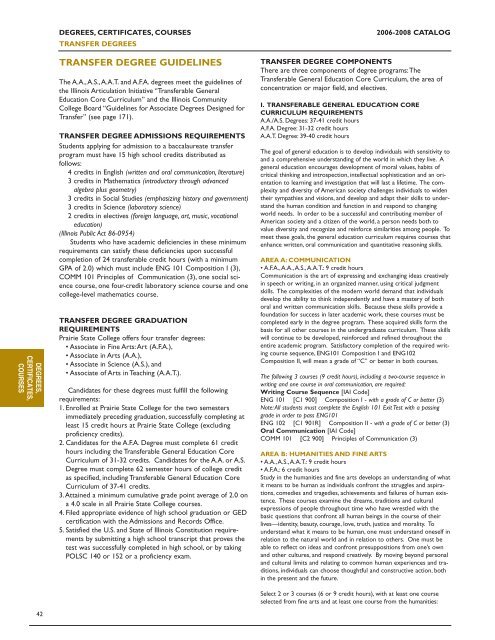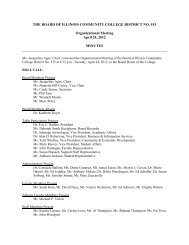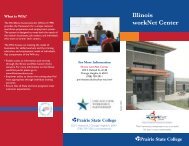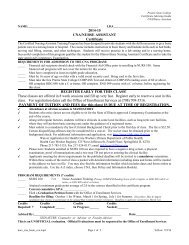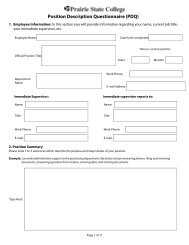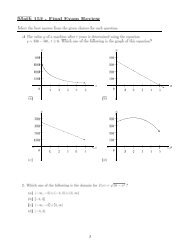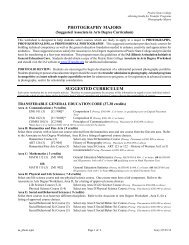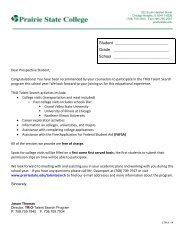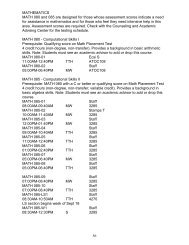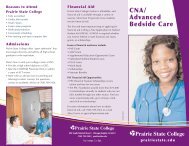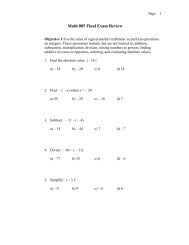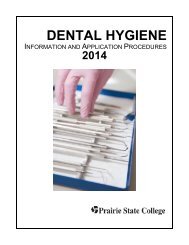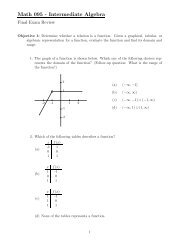DEGREES,CERTIFICATES,COURSES42DEGREES, CERTIFICATES, COURSESTRANSFER DEGREESTRANSFER DEGREE GUIDELINESThe A.A.,A.S.,A.A.T. and A.F.A. degrees meet the guidelines ofthe Illinois Articulation Initiative “Transferable GeneralEducation Core Curriculum” and the Illinois Community<strong>College</strong> Board “Guidelines for Associate Degrees Designed forTransfer” (see page 171).TRANSFER DEGREE ADMISSIONS REQUIREMENTSStudents applying for admission to a baccalaureate transferprogram must have 15 high school credits distributed asfollows:4 credits in English (written and oral communication, literature)3 credits in Mathematics (introductory through advancedalgebra plus geometry)3 credits in Social Studies (emphasizing history and government)3 credits in Science (laboratory science)2 credits in electives (foreign language, art, music, vocationaleducation)(Illinois Public Act 86-0954)Students who have academic deficiencies in these minimumrequirements can satisfy these deficiencies upon successfulcompletion of 24 transferable credit hours (with a minimumGPA of 2.0) which must include ENG 101 Composition I (3),COMM 101 Principles of Communication (3), one social sciencecourse, one four-credit laboratory science course and onecollege-level mathematics course.TRANSFER DEGREE GRADUATIONREQUIREMENTS<strong>Prairie</strong> <strong>State</strong> <strong>College</strong> offers four transfer degrees:• Associate in Fine Arts:Art (A.F.A.),• Associate in Arts (A.A.),• Associate in Science (A.S.), and• Associate of Arts in Teaching (A.A.T.).Candidates for these degrees must fulfill the followingrequirements:1. Enrolled at <strong>Prairie</strong> <strong>State</strong> <strong>College</strong> for the two semestersimmediately preceding graduation, successfully completing atleast 15 credit hours at <strong>Prairie</strong> <strong>State</strong> <strong>College</strong> (excludingproficiency credits).2. Candidates for the A.F.A. Degree must complete 61 credithours including the Transferable General Education CoreCurriculum of 31-32 credits. Candidates for the A.A. or A.S.Degree must complete 62 semester hours of college creditas specified, including Transferable General Education CoreCurriculum of 37-41 credits.3.Attained a minimum cumulative grade point average of 2.0 ona 4.0 scale in all <strong>Prairie</strong> <strong>State</strong> <strong>College</strong> courses.4. Filed appropriate evidence of high school graduation or GEDcertification with the Admissions and Records Office.5. Satisfied the U.S. and <strong>State</strong> of Illinois Constitution requirementsby submitting a high school transcript that proves thetest was successfully completed in high school, or by takingPOLSC 140 or 152 or a proficiency exam.2006-2008 CATALOGTRANSFER DEGREE COMPONENTSThere are three components of degree programs:TheTransferable General Education Core Curriculum, the area ofconcentration or major field, and electives.I. TRANSFERABLE GENERAL EDUCATION CORECURRICULUM REQUIREMENTSA.A./A.S. Degrees: 37-41 credit hoursA.F.A. Degree: 31-32 credit hoursA.A.T. Degree: 39-40 credit hoursThe goal of general education is to develop individuals with sensitivity toand a comprehensive understanding of the world in which they live. Ageneral education encourages development of moral values, habits ofcritical thinking and introspection, intellectual sophistication and an orientationto learning and investigation that will last a lifetime. The complexityand diversity of American society challenges individuals to widentheir sympathies and visions, and develop and adapt their skills to understandthe human condition and function in and respond to changingworld needs. In order to be a successful and contributing member ofAmerican society and a citizen of the world, a person needs both tovalue diversity and recognize and reinforce similarities among people. Tomeet these goals, the general education curriculum requires courses thatenhance written, oral communication and quantitative reasoning skills.AREA A: COMMUNICATION• A.F.A.,A.A.,A.S.,A.A.T.: 9 credit hoursCommunication is the art of expressing and exchanging ideas creativelyin speech or writing, in an organized manner, using critical judgmentskills. The complexities of the modern world demand that individualsdevelop the ability to think independently and have a mastery of bothoral and written communication skills. Because these skills provide afoundation for success in later academic work, these courses must becompleted early in the degree program. These acquired skills form thebasis for all other courses in the undergraduate curriculum. These skillswill continue to be developed, reinforced and refined throughout theentire academic program. Satisfactory completion of the required writingcourse sequence, ENG101 Composition I and ENG102Composition II, will mean a grade of “C” or better in both courses.The following 3 courses (9 credit hours), including a two-course sequence inwriting and one course in oral communication, are required:Writing Course Sequence [IAI Code]ENG 101 [C1 900] Composition I - with a grade of C or better (3)Note: All students must complete the English 101 Exit Test with a passinggrade in order to pass ENG101ENG 102 [C1 901R] Composition II - with a grade of C or better (3)Oral Communication [IAI Code]COMM 101 [C2 900] Principles of Communication (3)AREA B: HUMANITIES AND FINE ARTS• A.A.,A.S.,A.A.T.: 9 credit hours• A.F.A.: 6 credit hoursStudy in the humanities and fine arts develops an understanding of whatit means to be human as individuals confront the struggles and aspirations,comedies and tragedies, achievements and failures of human existence.These courses examine the dreams, traditions and culturalexpressions of people throughout time who have wrestled with thebasic questions that confront all human beings in the course of theirlives—identity, beauty, courage, love, truth, justice and morality. Tounderstand what it means to be human, one must understand oneself inrelation to the natural world and in relation to others. One must beable to reflect on ideas and confront presuppositions from one’s ownand other cultures, and respond creatively. By moving beyond personaland cultural limits and relating to common human experiences and traditions,individuals can choose thoughtful and constructive action, bothin the present and the future.Select 2 or 3 courses (6 or 9 credit hours), with at least one courseselected from fine arts and at least one course from the humanities:
2006-2008 CATALOGFine Arts CoursesArt [IAI Code]ART121 [F2 901 History of Western Art I (3)ART122 [F2 902] History of Western Art II (3)ART126 [F2 904] History of Photography (3)ART129 [F2 900] Art Appreciation (3) [not accepted for AFADegree]ART131 [F2 903N] Survey of Non-Western Art (3)Music [IAI Code]MUSIC 130 [F1 900] Introduction to Music Appreciation (3)MUSIC 132 [F1 904] American Music (3)Theatre [IAI Code]THTRE 101 [F1 907] Understanding Theatre (3)THTRE 104 [F1 908] History of Theatre (3)Humanities CoursesForeign Languages [IAI Code]FRENC 202 [H1 900] French IV (4)*GERM 202 [H1 900] German IV (4)*SPAN 202 [H1 900] Spanish IV (4)**While few baccalaureate institutions require a foreign or second language intheir campus-wide general education requirements, competency through two,three or four college semesters (or high school equivalent) in a single foreign/secondlanguage is required for the Bachelor of Arts degree at some universities.Thus, community college students who intend to transfer shouldcomplete the foreign language courses required by their intended institutionprior to transferring.Humanities [IAI Code]HUMAN 101 [H5 904N] Comparative Religions (3)HUMAN 201 [H9 900] Humanities Themes: Myth, Reason & God (3)Literature [IAI Code]ENG 211 [H3 914] American Literature I (3)ENG 212 [H3 915] American Literature II (3)ENG 215 [H3 910D] African-American Literature (3)ENG 221 [H3 903] Introduction to Poetry (3)ENG 231 [H3 912] British Literature I (3)ENG 232 [H3 913] British Literature II (3)ENG 240 [H3 901] Introduction to Fiction (3)ENG 243 [H3 908N] Non-Western Literature in Translation (3)ENG 252 [H3 902] Introduction to Drama (3)ENG 261 [H3 906] Western/World Literature I (3)ENG 262 [H3 907] Western/World Literature II (3)ENG 271 [H3 905] Introduction to Shakespeare (3)Philosophy [IAI Code]PHILO 201 [H4 900] Introduction to Philosophy (3)PHILO 202 [H4 904] Ethics (3)PHILO 203 [H4 906] Introduction to Logic (3)Interdisciplinary Humanities and Fine Arts [IAI Code] may be used for eitherhumanities or fine arts credit.HUMAN 202 [HF 900] Form and Structure in the Arts (3)AREA C: MATHEMATICS (3-6 credit hours)Mathematics focuses on quantitative reasoning as the basis for developingan understanding of the quantitative relationships found in both theworld of work and in everyday life. Mathematics provides the tools andskills necessary to organize thoughts, to apply problem-solving techniquesand understand patterns and processes in all fields. Mathematicsis used to determine reasonableness, identify alternatives and selectoptimal results. Individuals need to apply simple mathematical methodsto the solution of real-world problems.Select 1 to 2 courses (3 to 6 credit hours) from:Mathematics [IAI Code]MATH 112 [M1 904] General Education Math (3)MATH 115 [M1 902] General Education Statistics (3)MATH 112 and 115 are recommended for A.A. and A.F.A. students who donot intend to take higher levels of mathematics.BUS 240 [M1 902] Elementary Statistics (4)MATH 153 [M1 902] Probability and Statistics (4)MATH 153 is intended for students with advanced math skills; it may betaken in place of MATH 115. Students can receive credit for only one of BUS240, MATH 115 and 153.MATH 155 [M1 906] Finite Mathematics (4)DEGREES, CERTIFICATES, COURSESTRANSFER DEGREESMATH 157 [M1 900-B] Calculus for Business and Social Science (4)MATH 171 [M1 900-1] Calculus with Analytic Geometry I (5)MATH 172 [M1 900-2] Calculus with Analytic Geometry II (5)MATH 173 [M1 900-3] Calculus with Analytic Geometry III (5)MATH 206 [M1 903] Mathematics for Elementary Teaching II (4)**MATH 210 [M1 905] Discrete Mathematics (3)**Prerequisite: MATH 200 Mathematics for Elementary Teaching I (4)**MATH 206 fulfills general education requirements only for students seekingstate certification as elementary teachers. Students must complete bothMATH 200 and 206 prior to transfer.AREA D: PHYSICAL AND LIFE SCIENCES• A.S.,A.A.,A.F.A.,A.A.T.: 7-8 semester hoursThe study of science develops understanding of the methods of scientificinquiry, including the formulation and testing of hypotheses. Familiaritywith scientific principles enables one to discover and apply methodology,investigate and understand phenomena in the natural and physical worldand make informed decisions about personal and societal issues. Anunderstanding of the scientific method helps one to examine componentsof the living world and their interaction with the physical world.By becoming knowledgeable about the contemporary world of scienceand technology, the individual can relate more effectively to environmentaland technological issues facing a complex global society.Select 2 courses (7-8 credit hours), with one course selected from thelife sciences and one course from the physical sciences and including atleast one laboratory course from:(The “L” in the IAI code indicates a “lab science” course.)Life Science Courses [IAI Code]BIOL 100 [L1 900L] General Education Biology (4)BIOL 103 [L1 901] Plants and Society (3)BIOL 105 [L1 905] Environmental Biology (3)BIOL 106 [L1 906L] Heredity and Society (4)BIOL 112 [L1 900L] Organismal Biology (4)**This course is intended for science majors only and should not be selectedby non-science majors to meet general education science requirements.Student cannot receive credit for both BIOL 100 and 112.Physical Science Courses [IAI Code]ASTRO 101 P1 906] Guide to the Universe (3)ASTRO 104 [P1 906L] The Solar System and Beyond (4)CHEM 105 [P1 902L] Survey of General Chemistry (4)CHEM 110 [P1 902L] General Chemistry I (5)**This course is intended for science majors only and should not be selectedby non-science majors to meet general education science requirements.Student cannot receive credit for both CHEM 105 and 110.GEOG 105 [P1 909] Introduction to Physical Geography (3)GEOLO 101 [P1 907L] Physical Geology (4)GEOLO 102 [P1 907L] Historical Geology (4)METEO 150 [P1 905] Introduction to Meteorology (3)PHYSC 111 [P9 900L] Physical Science (4)PHYSC 112 [P9 905L] Earth Science (4)Students cannot receive credit for both METEO 150 and PHYSC 112.PHYSI 101 [P1 901L] Conceptual Physics (4)PHYSI 120 [P1 900L] <strong>College</strong> Physics I (4)*PHYSI 210 [P2 900L] University Physics I (4)**This course is intended for science majors only and should not be selectedby non-science majors to meet general education science requirements.Student cannot receive credit for both PHYSI 120 and 210.AREA E: SOCIAL SCIENCES AND BEHAVIORAL SCIENCES• A.A.,A.S.,A.A.T.: 9 credit hours• A.F.A.: 6 credit hoursSocial sciences focus on an appreciation of human continuity andchange. By analyzing the past, developing insights into contemporarylife and understanding the impact of individual and social actions on thefuture, students have a foundation for developing a sense of responsibilitytoward humanity and the environment. Through analysis of social,political, cultural, historical and economic institutions and relationshipsthat both link and separate societies in the world, students are able tounderstand their own society and the world as part of a global humanexperience. Beyond understanding the broad perspective, individualsDEGREES,CERTIFICATES,COURSES43
- Page 1 and 2: A comprehensive community college20
- Page 3 and 4: 2006-2008 CATALOGIllinois Community
- Page 5 and 6: 2006-2008 CATALOGCONTENTSOVERVIEW:
- Page 7 and 8: 2006-2008 CATALOGOVERVIEWGETTING AC
- Page 9 and 10: 2006-2008 CATALOGOVERVIEWASSOCIATE
- Page 11 and 12: 2006-2008 CATALOGOVERVIEWIllinois E
- Page 13 and 14: 2006-2008 CATALOGENROLLMENTSTARTING
- Page 15 and 16: 2006-2008 CATALOGENROLLMENT7. Pay t
- Page 17 and 18: 2006-2008 CATALOGENROLLMENTSPECIAL
- Page 19 and 20: 2006-2008 CATALOGPOLICIES & GUIDELI
- Page 21 and 22: 2006-2008 CATALOGPOLICIES & GUIDELI
- Page 23 and 24: 2006-2008 CATALOGPOLICIES & GUIDELI
- Page 25 and 26: 2006-2008 CATALOGPOLICIES & GUIDELI
- Page 27 and 28: 2006-2008 CATALOGPOLICIES & GUIDELI
- Page 29 and 30: 2006-2008 CATALOGSTUDENT SERVICESFI
- Page 31 and 32: 2006-2008 CATALOGSTUDENT SERVICESFI
- Page 33 and 34: 2006-2008 CATALOGSTUDENT SERVICESOT
- Page 35 and 36: 2006-2008 CATALOGSTUDENT LIFEEXPERI
- Page 37 and 38: 2006-2008 CATALOGSTUDENT LIFENORTH
- Page 39 and 40: 2006-2008 CATALOGSTUDENT LIFECULTUR
- Page 41 and 42: 2006-2008 CATALOGDEGREES, CERTIFICA
- Page 43: 2006-2008 CATALOGILLINOIS ARTICULAT
- Page 47 and 48: 2006-2008 CATALOGDEGREES, CERTIFICA
- Page 49 and 50: 2006-2008 CATALOGDEGREES, CERTIFICA
- Page 51 and 52: 2006-2008 CATALOGBUSINESSA.A. Degre
- Page 53 and 54: 2006-2008 CATALOGCOMPUTER SCIENCEA.
- Page 55 and 56: 2006-2008 CATALOGEARTH SCIENCE/GEOL
- Page 57 and 58: 2006-2008 CATALOGDEGREES, CERTIFICA
- Page 59 and 60: 2006-2008 CATALOGGENERAL MATH/SCIEN
- Page 61 and 62: 2006-2008 CATALOGLIBERAL ARTSA.A. D
- Page 63 and 64: 2006-2008 CATALOGPRE-MEDICINEA.S. D
- Page 65 and 66: 2006-2008 CATALOGPRE-OCCUPATIONAL T
- Page 67 and 68: 2006-2008 CATALOGPRE-PHYSICAL THERA
- Page 69 and 70: 2006-2008 CATALOGSOCIAL WORKA.A. De
- Page 71 and 72: 2006-2008 CATALOGDEGREES, CERTIFICA
- Page 73 and 74: 2006-2008 CATALOGCAREER PROGRAMSThe
- Page 75 and 76: 2006-2008 CATALOGAUTOMOTIVE ALIGNME
- Page 77 and 78: 2006-2008 CATALOGDEGREES, CERTIFICA
- Page 79 and 80: 2006-2008 CATALOGDEGREES, CERTIFICA
- Page 81 and 82: 2006-2008 CATALOGDEGREES, CERTIFICA
- Page 83 and 84: 2006-2008 CATALOGDEGREES, CERTIFICA
- Page 85 and 86: 2006-2008 CATALOGDEGREES, CERTIFICA
- Page 87 and 88: 2006-2008 CATALOGDEGREES, CERTIFICA
- Page 89 and 90: 2006-2008 CATALOGDEGREES, CERTIFICA
- Page 91 and 92: 2006-2008 CATALOGDEGREES, CERTIFICA
- Page 93 and 94: 2006-2008 CATALOGNURSINGContinuedNU
- Page 95 and 96:
2006-2008 CATALOGINDUSTRIAL ELECTRI
- Page 97 and 98:
2006-2008 CATALOGMANUFACTURING TECH
- Page 99 and 100:
2006-2008 CATALOGINFORMATION TECHNO
- Page 101 and 102:
2006-2008 CATALOGCOMPUTER REPAIR SP
- Page 103 and 104:
2006-2008 CATALOGSPREADSHEET - PROF
- Page 105 and 106:
2006-2008 CATALOGDEGREES, CERTIFICA
- Page 107 and 108:
2006-2008 CATALOGDEGREES, CERTIFICA
- Page 109 and 110:
2006-2008 CATALOGILLINOIS ARTICULAT
- Page 111 and 112:
2006-2008 CATALOGART 126 (IAI: F2 9
- Page 113 and 114:
2006-2008 CATALOGAUTO 214COLLISION
- Page 115 and 116:
2006-2008 CATALOGBIOL 225FUNCTIONAL
- Page 117 and 118:
2006-2008 CATALOGBUS 169MATERIALS H
- Page 119 and 120:
2006-2008 CATALOGBUS 270INTERNATION
- Page 121 and 122:
2006-2008 CATALOGCHEM 203 (IAI: BIO
- Page 123 and 124:
2006-2008 CATALOGCET 114DIGITAL FUN
- Page 125 and 126:
2006-2008 CATALOGDH 108CLINICAL DEN
- Page 127 and 128:
2006-2008 CATALOGEARLY CHILDHOOD ED
- Page 129 and 130:
2006-2008 CATALOGED 220CHILDREN’S
- Page 131 and 132:
2006-2008 CATALOGEMS 230PARAMEDICIN
- Page 133 and 134:
2006-2008 CATALOGENG 241CONTEMPORAR
- Page 135 and 136:
2006-2008 CATALOGFST 213FIRE SERVIC
- Page 137 and 138:
2006-2008 CATALOGGC 185DIGITAL SOUN
- Page 139 and 140:
2006-2008 CATALOGHIST 112 (IAI: S2
- Page 141 and 142:
2006-2008 CATALOGAPPIE 106DC MOTORS
- Page 143 and 144:
2006-2008 CATALOGAPPIE 290SPECIAL T
- Page 145 and 146:
2006-2008 CATALOGNETWORKING - ITNET
- Page 147 and 148:
2006-2008 CATALOGITPRG 141INTRODUCT
- Page 149 and 150:
2006-2008 CATALOGITWEB 220INTERNET
- Page 151 and 152:
2006-2008 CATALOGMAINTENANCE TECHNI
- Page 153 and 154:
2006-2008 CATALOGMATH 096GEOMETRYPr
- Page 155 and 156:
2006-2008 CATALOGMILLWRIGHT - APPRE
- Page 157 and 158:
2006-2008 CATALOGMUSIC 152 (IAI: MU
- Page 159 and 160:
2006-2008 CATALOGNURS 103TRANSITION
- Page 161 and 162:
2006-2008 CATALOGPHOTO 282EXPERIMEN
- Page 163 and 164:
2006-2008 CATALOGPE 163GOLFPrerequi
- Page 165 and 166:
2006-2008 CATALOGPLUMBING, PIPEFITT
- Page 167 and 168:
2006-2008 CATALOGREGISTERED NURSING
- Page 169 and 170:
2006-2008 CATALOGSRT 298SURGICAL TE
- Page 171 and 172:
2006-2008 CATALOGWELDER - APPRENTIC
- Page 173 and 174:
2006-2008 CATALOGGRADUATION & TRANS
- Page 175 and 176:
2006-2008 CATALOGGRADUATION & TRANS
- Page 177 and 178:
2006-2008 CATALOGDIRECTORYMEETING O
- Page 179 and 180:
2006-2008 CATALOGEXECUTIVE OFFICERS
- Page 181 and 182:
2006-2008 CATALOGDIRECTORYFACULTYFA
- Page 183 and 184:
2006-2008 CATALOGProfessor John Lim
- Page 185 and 186:
2006-2008 CATALOGCheryl Bland-Winbu
- Page 187 and 188:
2006-2008 CATALOGDIRECTORYSUPPORT S
- Page 189 and 190:
2006-2008 CATALOGDIRECTORYSUPPORT S
- Page 191 and 192:
2006-2008 CATALOGINDEXCollege Bowl
- Page 193 and 194:
2006-2008 CATALOGINDEXpre-Manufactu


